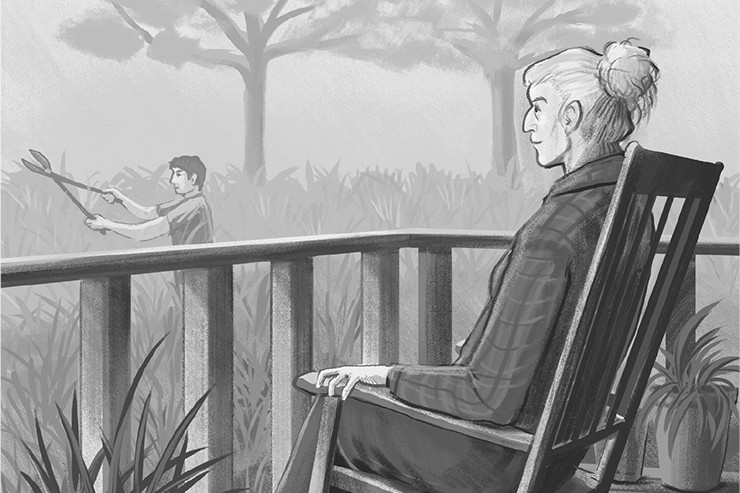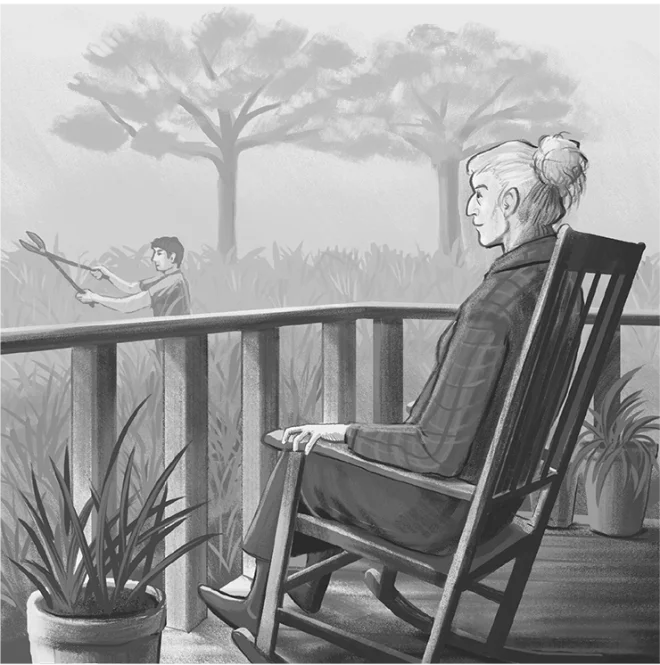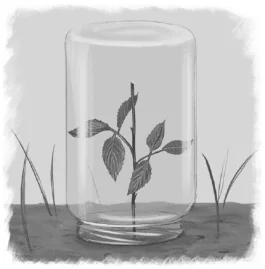
There’s something to be said for old gardening books. Some of them are quite fascinating, filled with folk remedies, different uses for various herbs and plants, and plenty of first-hand knowledge about gardening.
Old gardening books are also interesting in that some of those planting tips and garden remedies from bygone days have been scientifically proven to work. One of many examples comes from sailors including lime juice in their diets to prevent scurvy. Today we know that’s because our bodies need vitamin C, which comes from limes (among other sources). At the time, however, it was merely a folk remedy.
But why dig through old gardening books when you have someone like Auntie! Jim Dronenburg writes in Auntie that his great aunt was one who believed that you should “Never put your Wish-bone where your Back-bone ought to be.”
Auntie was full of advice. She was “extremely practical, hardheaded, self-sufficient, and feared neither man nor beast.”
I’ll be the first to say that I truly enjoyed this story. Gardening books are fantastic, but with a character like Auntie around, who needs a book? All the knowledge you could want is sitting right there, just waiting to share it with you. I hope you enjoy this story as much as I did.
They Might Not Be Old Gardening Books, But We Have Plenty of Old Gardening Stories Here in GreenPrints.
This story comes from our archive spanning over 30 years, and includes more than 130 magazine issues of GreenPrints. Pieces like these that imbue the joy of gardening into everyday life lessons always brighten up my day, and I hope it does for you as well. Enjoy!

Auntie
She never put her Wish-bone where her Back-bone was supposed to be.
By Jim Dronenburg

As I get older I remember my great-aunt, Auntie. All my other great-aunts were Aunt So-and-so, but she was always Auntie. She was, as she called it, “a maiden lady,” and her family didn’t have much by today’s standards. Everything she had in the garden was given to her, or from seed, or bought (a last resort) very cheaply. She was 62 when I was born, and by the time I had my driver’s license, she welcomed me coming out when I could make time (and borrow the car) to help fight the jungle of her yard. This continued all through my Navy years, when I was home.
She’s been gone now nearly 30 years, and her house sold long ago. Everything she had in her landscape was ripped out by one later owner or another. The only things remaining are the shape of the land and two silver maple trees in front of the house that were old when I was young. “They were given to me by the Misses Sellman in 1923. They also gave me the white lilac.”
“…Uh…what white lilac?” I made the mistake of asking.
“The one at the end of the garden, of course, under that maple tree,” she said, pointing to an impenetrable patch of jungle eight feet high.
Well, that was a challenge. So in I went with pruners, loppers, and handsaw. Sure enough, there was a lilac in there, under another honking huge silver maple. Along with blackberries, wineberries, wild rose, honeysuckle, and, as I kept discovering over the next four days, quite a lot of poison ivy…
She had a small, framed paper print that declared, “Never put your Wish-bone where your Back-bone ought to be.” She lived by that. I have it now. I try to live by it, too.
I learned a lot from Auntie. Like for instance, that honeysuckle and climbing roses are a marriage made in…well, not in heaven, that’s for certain. I learned that if you want a rose, take a cutting, plant it in the earth in the shade, put a Mason jar over it, and leave it alone. It worked. Oddly enough, it worked better for me then than now when I have a greenhouse and rooting powder.
The one thing that defeated her was a rose called Radiance, from the nineteen-teens I think. My parents had it, and for years she tried and tried, and it wouldn’t take. It’s not in the garden centers today, but back then it was available, bare root and waxed, in plastic bags filled with peat moss at the five-and-dime stores. So I bought one for her.
She was huffy about it. That was cheating.
Sometimes a teenager just can’t win.
I admit, my parents had an extremely small yard, and once I could drive, I regarded Auntie’s acre-plus as an additional opportunity for me to plant. I was forever getting things “that I thought you’d like, Auntie.” I know now that she saw right through me, but she took it in good grace.
“I saw this magnolia and thought you ought to have it.”
“H’mph,” came the reply. “Little stick of a thing, isn’t it? Well, you can put it down at the end of the garden.”
That tree taught me patience. It WAS a little stick, and it was ten years before it was a “proper small tree.”
I learned about memory from Auntie. I brought her a small, bagged apple tree.
“H’mph,” was the response. “Well, put it down at the fence line. There have always been apple trees down there.”
One full afternoon of clearing brush later, I had managed to cut a swath eight feet in and finally found the fence. I cleared a spot and planted the tree. I didn’t know about soil amendments then, of course, but the dirt was pretty good. I watered it in, and when I got home I told my mother about it.
She snickered. “The last of those apple trees went down when I was about eight.” My mother was 55 at the time.
Auntie was a rare one. One thing that always amused me, and which my mother warned me always to keep a straight face about, was that if Auntie encountered a problem she’d never faced before, she would solve it quickly and efficiently with the materials at hand. Give her the same problem she solved in 1939, though, and she would demand the same materials, bought from the same store, and preferably at the same price. I was told that if she had me get something for her, to lose the receipts on the way back, and all would be well.
Auntie was extremely practical, hardheaded, self-sufficient, and feared neither man nor beast, except in the matter of snakes and she lived in the country. She didn’t think the planet was big enough for her and something with no feet. When I was in my late teens, new neighbors moved in across the road from her. For nearly a month she sat on her porch waiting for them to call on her—that was the way it was done, in her book; she would not go to them. That wasn’t “respectable.” I heard this, snuck off across the road, and told the new people what was up. About a half hour later, they paid a call. Then everything was good. Perhaps a month later I took Auntie across the road to their house and we sat in the kitchen. It was late fall. The wife mentioned that they had had a mouse problem.
The husband said, “I took care of that, though. I went out one cold morning last week, found a big old black snake, brought it in, and shoved it into a mouse hole. All hell broke loose in the walls for a day or so—and then silence. I wonder where it is now?”
His wife replied, “Oh, I went down to the cellar this morning, and it was there at the bottom of the stairs. A big pool of black with two eyes.”
I swear to you, Auntie was out the door in 30 seconds, totally politely and respectably of course, but I have no recollection of her feet hitting the floor at all.
In the last years, she could not live at her house. She refused to let my parents pipe water in or install heat (she had a coal stove in the living room)—”it would be changes in the house”—and moved in with my grandmother in her apartment for the winters, going back Out Home for the summer, chamber pot and all. When my grandmother died, she stayed in the apartment year-round, going Out Home when someone would take her for the day, but still maintaining stoutly that Out Home was where she lived.

Auntie died just shy of 96, in 1987. I miss her still. I like to think of her now, Out Home again, young enough to be working in her garden, a cupboard full of Mason jars, and God in His garden just across the road (she would, as the newcomer, have called on Him first), giving her cuttings of anything she wants.
They all take. ❖
By Jim Dronenburg, published originally in 2018, in GreenPrints Issue #114. Illustrated by Lydia Guadagnoli

What do you think? Do you have an older gardener in your life that’s taught you about planting and gardening? I’d love to read about them in the comments.




I loved this story I bet there are many more “Anties” out there. Bring more of stories to the publication.